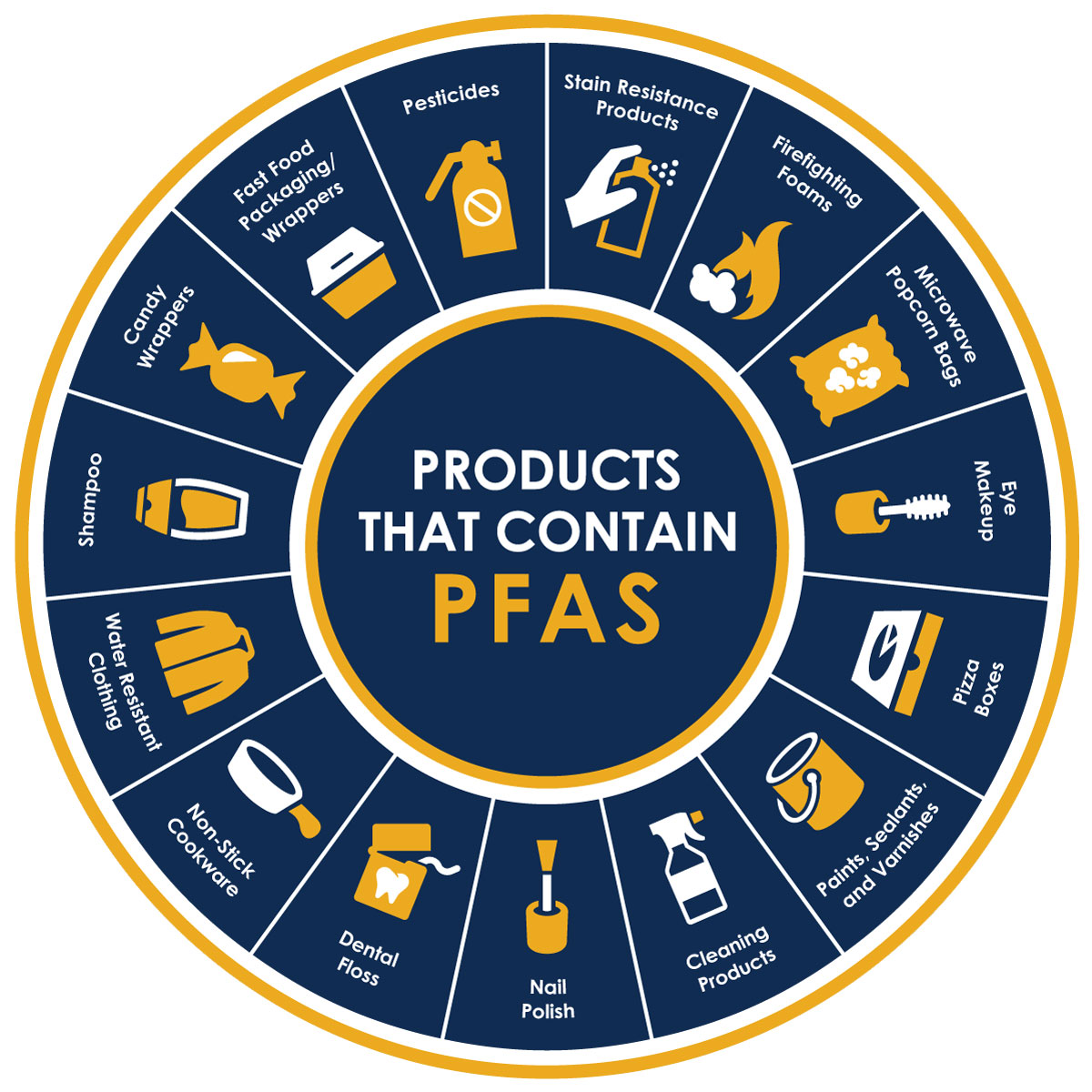PFAS Legislation Proliferates Across The Nation

Photo: riversideca.gov
By Maura and Art Keene
Over two dozen states have introduced legislation restricting or banning the use of PFAS chemicals with over 200 bills now pending in state legislatures. Several states have already passed restrictions or bans on the use or sale of products containing the chemicals. These laws vary in scope. Maine’s newly enacted law is the most comprehensive, and a new omnibus bill under consideration in Massachusetts would follow suit. New York, Pennsylvania, Vermont, Colorado, and California are among the states with partial limitations on PFAS chemicals.
The thousands of chemicals in the group known as perfluoroalkyl and polyfluoroalkyl substances, or PFAS, are found in cookware, packaging, cosmetics, clothing, carpet, electronics, firefighting foam, artificial turf, and many other products. PFAS molecules have a chain of linked carbon and fluorine atoms. Because the carbon-fluorine bond is so strong, these chemicals do not degrade easily in the environment and accumulate and hence these compounds are referred to as forever chemicals.
PFAS are highly toxic to multiple organ systems and are implicated in several different cancers. They are suspected of causing damage to the immune system, metabolic changes, and a decrease in fertility, Acceptable levels of exposure have not been established for humans but toxicologists agree that the risks of harmful exposure through contact, absorption, or inhalation are real. The scientific consensus is that there is no such thing as safe levels of PFAS exposure. Yet, PFAS compounds are present in the blood of 97% of Americans. Current efforts to heavily regulate or ban PFAS are in response to the increasing evidence that they pose a public health hazard.
Maine’s law bans all “intentionally added” PFAS substances from all products sold in the state beginning January 1, 2023 for rugs and carpets. The ban is being phased in for other products in order to allow companies time to adapt. The state plans to ban all PFAS containing products by 2030, except when the PFAS use is considered unavoidable. Maine’s law also requires clear labeling of the amount and type of PFAS chemicals contained in a product and their purpose, which may be important in the future for determining liability for health problems thought to result from exposure to PFAS.
In Massachusetts, an omnibus bill SD 2053, introduced in January of 2023, encompasses many smaller and more focused pending legislation aimed at regulating or banning PFAS or the products that contain them. Amherst’s State Senator Jo Comerford is a co-sponsor of that legislation. The bill stipulates that beginning June 1, 2026, “No manufacturer, distributor, wholesaler or retailer shall offer for sale, sell or distribute in the commonwealth any products to which PFAS have been intentionally added, unless the department has determined that the use of PFAS in the product is a currently unavoidable use and grants a temporary exemption at intervals of no more than 3 years.” Comerford says that the list of products that cannot be manufactured without PFAS is quite short although manufacturers argue otherwise.
PFAS regulations have met resistance from manufacturers who claim that not all PFAS chemicals are the same, and some may be harmless. These claims have yet to be substantiated. Because PFAS do not degrade, they accumulate in the environment and in the plants, animals and humans exposed to them.
According to the Massachusetts bill, the attorney general is responsible for enforcement. The bill also requires the state to establish a comprehensive PFAS education program. And it requires the Department of Environmental Protection to develop regulations to monitor groundwater, drinking water, and soil, including private wells. Monitoring will rest with local Boards of Health, with a fund set up for mitigation. Firefighting equipment must also be PFAS free, and the discharge of any firefighting foam containing PFAS must be reported to the DEP within 48 hours, so that the effects of that discharge on the exposed personnel and environment can be monitored.
Several states, including Florida, Vermont, and New Hampshire have established funds to remediate PFAS contamination. In another 15 states, the attorneys general have sued companies accused of causing the pollution.
Artificial Turf And Local Regulation
The question of whether PFAS in artificial turf poses a significant health hazard has received considerable attention and has been the source of contention in most communities considering the installation of such fields including in Amherst (see, e.g., here and here and here and here). At the moment, all artificial turf sold and manufactured in the United States contains PFAS.
Several municipalities have adopted bans on the installation of artificial turf. Most notable among the communities banning artificial turf is Boston which has adopted a partial ban, prohibiting the installation of any artificial turf in all public parks. Other communities that have introduced bans or that have adopted moratoriums or that have such actions pending include: Marblehead, MA, Concord, MA, Martha’s Vineyard, MA, Nantucket, MA, Littleton, MA, Hartford, CT, Westport, CT, Hampden, CT, Greenwich, CT, Rye, NY, New York City, NY, Rochester, NY, Montgomery County, Maryland, and Edmonds Washington. Some of these bans are limited to turf that uses crumb rubber infill. Details here.
Read More:
This Law Is Going To Impact Nearly Every Business In Maine (News Center Maine)
PFAS Bans, Restrictions ,Go Into Effect In States In 2023 (Bloomberg Law)
States Take On PFAS With Legislation, Lawsuits (Pew)
More US States Ban PFAS Containing Products (Underwriters Laboratories)
